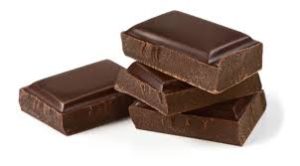 The evidence keeps piling up that certain foods are associated with health, while other foods (e.g., soda, ultra processed foods) are associated with chronic diseases. A recent article reported the results of several studies finding certain foods linked to cardiovascular health, including lowering blood pressure.
The evidence keeps piling up that certain foods are associated with health, while other foods (e.g., soda, ultra processed foods) are associated with chronic diseases. A recent article reported the results of several studies finding certain foods linked to cardiovascular health, including lowering blood pressure.
But guess what? They are popular foods available to everyone - cocoa, green tea, black tea, apples, grapes, and berries.
 There is strong evidence certain plant compounds (flavan-3-ols, also known as flavanols or catechins) in these foods have beneficial effects on cardiovascular health. These compounds can lower blood pressure and improve endothelial function (functioning of the blood vessels). Two to three cups of tea daily! One to two servings of dark chocolate daily! Instead of chips for a snack, have an apple.
There is strong evidence certain plant compounds (flavan-3-ols, also known as flavanols or catechins) in these foods have beneficial effects on cardiovascular health. These compounds can lower blood pressure and improve endothelial function (functioning of the blood vessels). Two to three cups of tea daily! One to two servings of dark chocolate daily! Instead of chips for a snack, have an apple.
By the way, rather than focusing on eating just certain foods, it's better to improve your entire diet by eating more fruits, vegetables, whole grains, legumes, seeds, and nuts. All these foods are linked to good health and are considered part of a heart-healthy diet.
From Medscape: From Apples to Cocoa: Everyday Foods Linked to CV Benefits
The term “healthy diet” is often used but frequently remains vague. This is why scientific research into specific food components with preventive potential is gaining importance. Current studies suggest that certain plant compounds found in everyday foods such as apples, cocoa, and tea may have beneficial effects on cardiovascular (CV) health. ...continue reading "Common Foods Linked to Improved Heart Function"

 Many of us absolutely desire and need a caffeine containing beverage such as coffee or tea in the morning, and find it difficult to function without it. So, findings from a recent
Many of us absolutely desire and need a caffeine containing beverage such as coffee or tea in the morning, and find it difficult to function without it. So, findings from a recent  Pregnant women have been advised to keep their consumption of coffee and other caffeinated beverages (tea, sodas, cocoa, energy drinks), and chocolate containing foods to a minimum for decades. Currently the American College of Obstetrics recommends that women consume less than 200 mg of caffeine (from any source) per day during pregnancy. This is less than 2 cups of regular coffee or 4 cups of regular black tea. But a recent study's findings suggest that the levels should be kept much lower.
Pregnant women have been advised to keep their consumption of coffee and other caffeinated beverages (tea, sodas, cocoa, energy drinks), and chocolate containing foods to a minimum for decades. Currently the American College of Obstetrics recommends that women consume less than 200 mg of caffeine (from any source) per day during pregnancy. This is less than 2 cups of regular coffee or 4 cups of regular black tea. But a recent study's findings suggest that the levels should be kept much lower. OK, this study was done in mice, but it's the kind of
OK, this study was done in mice, but it's the kind of